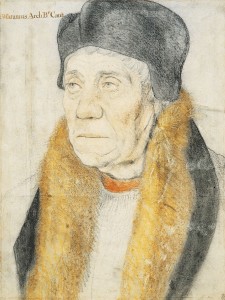 Breaking news! Yes, on this day in history, 15th March 1532, King Henry VIII used “foul language” to William Warham, Archbishop of Canturbury, after the archbishop criticised the king in the House of Lords when Parliament was discussing the proposed annulment of Henry VIII’s marriage to Catherine of Aragon.
Breaking news! Yes, on this day in history, 15th March 1532, King Henry VIII used “foul language” to William Warham, Archbishop of Canturbury, after the archbishop criticised the king in the House of Lords when Parliament was discussing the proposed annulment of Henry VIII’s marriage to Catherine of Aragon.
Carlo Capello, the Venetian ambassador, recorded what happened in a letter to the Council of Ten, the government of Venice:
“On the 15th instant the Parliament met to discuss the affair of the divorce, and the Archbishop of Canterbury spoke against the King much to the indignation of his Majesty, who used foul language to him, saying that were it not for his age, he would make him repent of having said what he did against his Majesty.”
Oh dear! I wonder what was considered “foul language” back then! I bet the words and the threat left the archbishop, who is thought to have been in his early 80s, very shaken. It definitely made him back down in his outspoken opposition to the king’s plans.
Warham died five months later, on 22nd August 1532, while visiting his nephew in Hackington, Kent. He had been Archbishop of Canterbury from 1503 and had also served Henry VIII as Keeper of the Great Seal and Lord Chancellor. He was buried in Canterbury Cathedral, having left instructions to be buried near the spot where Thomas Becket was killed. On 30th March 1533, the office of Archbishop was filled by Thomas Cranmer, a man who supported the annulment wholeheartedly and who was able to declare the annulment of the king’s first marriage on 23rd May 1533.
Notes and Sources
- Calendar of State Papers Relating to English Affairs in the Archives of Venice, Volume 4: 1527-1533: 754.